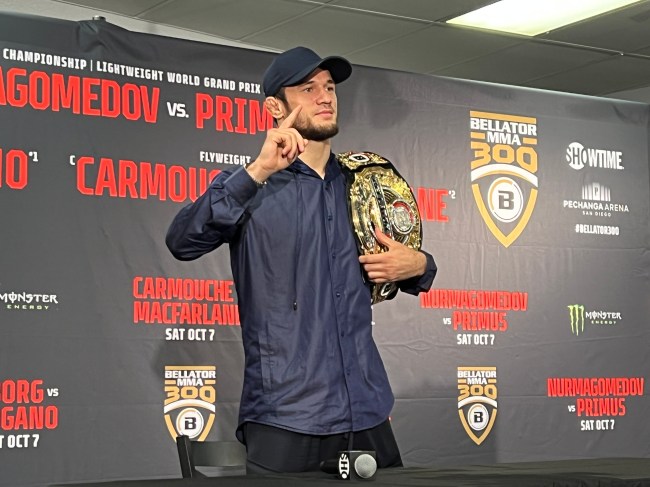
Dan Shapiro
Bellator MMA president Scott Coker was tight lipped and hush hush on Saturday night following the promotion’s 300th event. Deflecting questions about about the rumored pending sale of Bellator to the Professional Fighters League (PFL), Coker instead focused on his champions – lightweight Usman Nurmagomedov, featherweight Cris Cyborg, and flyweight Liz Carmouche – all of whom retained their titles with dominant performances at Bellator 300.
Coker, a savvy promoter with decades of experience, had all the right answers after the fight, choosing to highlight the work he has done with Bellator, growing from a regional brand on network cable into a global promotion that packs arenas around the world. He even managed to make a title fight in the cage, squaring challenger Leah McCourt, who earned a TKO win at Bellator 300, off against champion Cris Cyborg, following the latter’s first-round victory.
It was seemingly business as usual at the Pechanga Arena in San Diego for Bellator as the promotion celebrated 300 fight cards. However, it was impossible to ignore the buzz of the rumored sale, which dominated the chatter backstage.
Rather than hint, guess, or theorize about if, or when, Bellator may fold (the promotion is holding an excellent fight card in Chicago in five weeks), let’s instead take a collective moment to emphasize just how important this promotion has been to the overall landscape of mixed martial arts, and how they’ve cemented themselves as the number-two player in the MMA space over the last decade and a half.
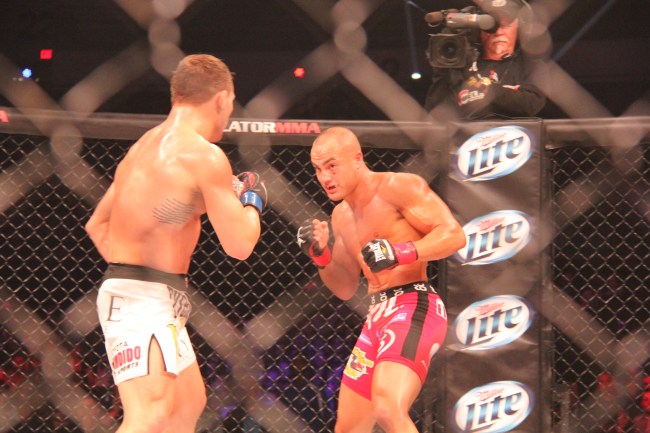
What is Bellator?
Having covered many of the biggest fight cards in MMA history, I’ve seen mixed martial arts shift from its no-hold-barred/anything-goes aesthetic into a global giant that rivals mainstream sports. The industry leading UFC has become an international phenomenon, taking the world by storm with its slick production and celebrity cache. But that’s not necessarily how MMA has always been, or should always be, for that matter. It’s a sport of outlaws and outsiders, after all, and with that comes a certain air of combustibility that adds a level of excitement and danger into any fight week.
The culture of mixed martial arts and fight promotion was never meant to be contained in a nice perfect box with a glittery wrapper around it, and regardless of how their fights fared, Bellator always delivered an exciting backdrop for the chaos of MMA.
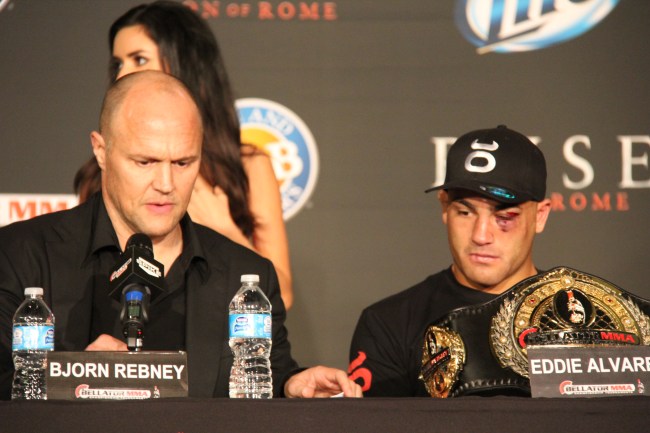
It was a random day in May 2014, before Scott Coker and Viacom/Paramount even took control of the promotion, that I received a last minute invite from Bellator’s former PR guy to stop by an impromptu photo session in Hollywood. No advance notice. No press release. Just a call during my lunch break to go interview Eddie Alvarez and hang out with the ring card girls. There must have been four media members there. Cameras rolled during a promotional shoot, and afterward, Alvarez and I discussed Philadelphia and the Rocky movies at length before I returned to my day job in post production.
This kind of off-the-cuff interaction wasn’t uncommon for Bellator during its early years under founder Bjorn Rebney. It’s a far cry from the organization Bellator has become, but the chaos of the Bjorn era was still entertaining and intriguing. In a lot of ways, they were making it up as they went along back then, which is how I ended up in Orange County one day, interviewing Rebney for an hour in his office. From there it was off to interview the painfully verbose Tito Ortiz for 90 minutes. He said everything and nothing at all promoting his Bellator 106 bout against Quinton “Rampage” Jackson. Imagine the horror of transcribing that interview, only to learn that the fight eventually would be canceled.
Still, the Eddie Alvarez vs. Michael Chandler rematch at Bellator 106 would be my first U.S. MMA event. And after years of promoting mixed martial arts fights alongside the Chinese government, I instantly appreciated what Bellator was always trying to do. They aimed to raise the profile of MMA while keeping much of the early aesthetic and integrity of the sport and culture intact.
In some way, this was best witnessed at Bellator’s casino shows. I can vividly recall Ortiz, one of the first stars of Zuffa-era UFC, being mobbed by merched out fans and groupies in the halls of the Pechanga Resort Casino. Hundreds of hopefuls just dying for a selfie or an autograph.
Inside the ballroom, at Bellator 116, current top-10 UFC heavyweight Alexander Volkov blasted the rotund and diminutive “Mighty” Mo Siliga with a first round head kick. Perennial top-20 heavyweight Blagoy Ivanov headlined that card, recording a first round Americana submission, and Philipe Lins, a current UFC signee whose greatest success came in the PFL, where he won a title and one-million dollars, fought on the prelims.
However, when looking even further down that card, at names like Karo Parisyan and Rob Emerson, Bellator’s identity was even more evident.

Bellator’s Identity
Mention of Parisyan and Emerson is auspicious given that Bellator was never trying to be the UFC, and both fighters were affiliated with the fifth season of the tentpole reality show The Ultimate Fighter. But, after the UFC left Spike TV and Bellator moved operations over to the Viacom-owned cable station, there was an even greater influx of former Octagon stalwarts heading into Bellator’s cage. First, fighters like Ortiz and “Rampage” switched promotions, and when Coker took the reins, he added MMA stalwarts like Stephan Bonnar, along with viable talent like Benson Henderson, Ryan Bader, Rory MacDonald, and Gegard Mousasi.
Under Coker, Bellator was becoming a much slicker machine, moving from the tournaments on the casino floors of middle America into its Grand Prix era in arenas in Italy, Israel, Ireland, and Tokyo. Even with a growing roster and higher production value, Coker never shied away from the circus theatrics of MMA. In fact, Coker embraced the bizarre, signing Kimbo Slice to a deal and promoting a trilogy matchup between UFC 1 and 2 champion Royce Gracie against his main rival, Ken Shamrock.
The tactic of combining the outrageous with competitive sport worked, and after long, Bellator was promoting its MMA rodeo in the most famous arena in sports: Madison Square Garden.
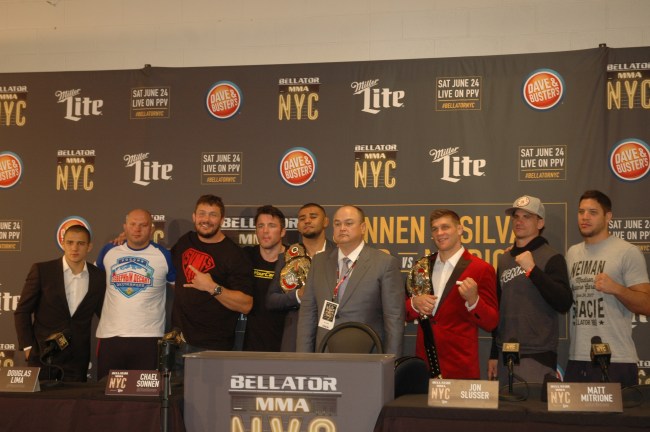
With Chael Sonnen headlining at MSG against Wanderlei Silva, Bellator NYC was probably the promotion’s high point in terms of popularity. While the roster has continued to improve over the last six years, that 2017 card — it also featured the Fedor Emelianenko vs. Matt Mitrione double knockdown, a trio of title fights (Brent Primus defeated Michael Chandler, Douglas Lima waxed Lorenz Larkin, and Ryan Bader edged Phil Davis), and the unsuccessful debut of wunderkind Aaron Pico (who has looked exceptional of late) — was peak Bellator.
After the fight, unknown lightweight journeyman Zach Freeman raced up 8th Ave. introducing himself to strangers, willfully telling anyone within earshot that he had just upset the biggest prospect in MMA in only 24 seconds. Down the block, Fedor was with his team, nursing a beer at the Tick Tock Diner, while Primus, sporting a crushed red velvet coat, celebrated his title win with friends. Ah, those fuzzy Bellator memories.
Sonnen would eventually lead Bellator back to the Garden in 2019, calling it a career in the arena after losing to Lyoto Machida via TKO. He has since worked for Bellator in various hosting and commentating roles. And actually, it’s behind the microphone that Sonnen has really done his best work.
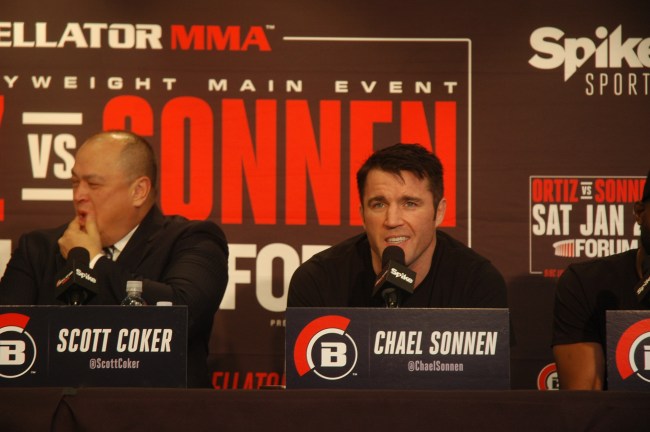
All-Time Favorite Bellator Moment?
Having covered no less than nine live Bellator events, there is one moment that stands out above the rest.
No, it wasn’t Alvarez getting his lightweight title back from Chandler in 2013, or MacDonald’s valiant effort to finally win his first major championship in 2018. It wasn’t the Freeman upset, the Mitrione/Fedor double knockdown, or watching Brennan Ward complete his miraculous comeback earlier this year. It wasn’t A.J. McKee’s perfect rise to the top of the Bellator promotion, going from unsigned amateur to featherweight champion over the course of 18 fights, either.
Nor was it witnessing a 2019, 27-year-old, 5-0 version of Johnny Eblen fight on the postlims in the Pechanga ballroom.
It wasn’t even in the cage at all. But rather, it was the jackal story …
Back in 2017, when Sonnen was promoting his Bellator debut against Tito Ortiz, the two shared the dais in Hollywood with Coker and a few other notables for a press conference. For the better part of 40 minutes, Sonnen verbally danced circles around Ortiz, insulting the “Huntington Beach Bad Boy” in ways that, at times, the former longtime UFC light heavyweight champ was too slow to even realize. It was one of the better moments in MMA press conference history, honestly. So smooth it was, that even Bellator didn’t know what kind of a bargain they got for the quick-witted, silver-tongued “American Gangster.”
Coker himself cleverly used chapstick to hide his uncontrollable smirk, but there was just something about Sonnen’s delivery of “tell another jackal story about Christopher Walken,” after Ortiz waxed nonsensically.
Okay, the Fedor/Mitrione double knockdown was better, but Sonnen’s timing was totally perfect. And timing seems to be what it’s all about these days.
#Bellator300 Post Fight Press Conference: Scott Coker Talks Bellator Promotion Status, Cyborg vs. McCourt & Non-compete clause https://t.co/J5nJKMEC2d @brobible @gifdsports
— Dan Shapiro (@ByDanShapiro) October 8, 2023
What’s Left for Bellator?
With MMA going way more mainstream and newer organizations attempting to refine a sport that was meant to be rough around the edges, Bellator’s niche has sort of lost some appeal to a newer generation of post-pandemic fans who just want two fight cards a week, leaving very little to the imagination.
Still, Bellator has a champion like Eblen, who is arguably the best middleweight in the world. They also have a top-five caliber lightweight in Usman Nurmagomedov, and the most consistently good fighter in women’s MMA history, Cyborg. There’s also a majorly compelling bantamweight title fight between champion Sergio Pettis and Grand Prix winner Patchy Mix coming up on November 17 at Bellator 301.
Hands down, as of today, the Pettis vs. Mix matchup is currently the best bantamweight fight on the books in any promotion on earth. And, the rest of the card features a welterweight title fight, the semifinals of the lightweight Grand Prix, as well as the return of McKee. It’s appointment viewing for any MMA hardcore, but for the general public, who may or may not have a subscription to Paramount+ or Showtime, there’s a barrier to entry that’s often tough to justify when ESPN products dominate the entire sports streaming landscape.
Without a viable subscriber base at Paramount, Bellator might just be swallowed up by a perfect storm of the shrewd nature of the fight business, a seismic shift in how content is viewed, and the reshaping of Hollywood studios and distribution following the WGA and SAG strikes.
In some way, a sale to the PFL could be the biggest thing out there for Bellator at the moment. A proper takeover card on PPV featuring Eblen and the Pettis/Mix winner in showcase fights (PFL does not yet have bantamweight and middleweight divisions), a Cyborg vs. Kayla Harrison Super Fight, and a title unification between Nurmagomedov and PFL’s lightweight champion could probably sell if marketed correctly. But then that might just be it for Bellator, right?
That seems to be the kind of uncertainty over at Bellator HQ these days, or at least that’s the vibe they’re giving off. And yet, Coker and company are still out here making fights and promoting events with some of the best in the world. So why stop now?
If done right, there could still be value to the brand name, or at least a biannual co-promotion with PFL. If anyone knows how to co-promote, it’s Coker, who has done it for years with Rizin. Easier said than done, maybe.
At this point, it’s really just a wait and see type of situation, which is exactly what Coker has been saying all along. And for now, the focus shifts to Bellator 301 on November 17. Beyond that, anyone’s guess is as good as the next.
𝗧𝗪𝗢 𝗧𝗜𝗧𝗟𝗘 𝗙𝗜𝗚𝗛𝗧𝗦, 𝗢𝗡𝗘 𝗚𝗣 𝗦𝗘𝗠𝗜𝗙𝗜𝗡𝗔𝗟 🔥#Bellator301 comes to Chicago on November 17th. Tickets are on-sale now 🎟️ https://t.co/AKvGf9Og4F pic.twitter.com/Ae7KEJH15n
— Bellator MMA (@BellatorMMA) October 9, 2023
Bellator 300 Results
- Usman Nurmagomedov (18-0) defeated Brent Primus (12-4) via unanimous decision (50-45, 50-45, 50-45)
- Cris Cyborg (27-2, 1 NC) defeated Cat Zingano (14-5) via KO (punches) at 4:01 of round one
- Liz Carmouche (20-7) defeated Ilima-Lei Macfarlane (13-3) via TKO at :17 of round five
- Jackie Cataline (4-3) defeated Lorrany Santos (6-2) via unanimous decision (30-27, 30-27, 30-26)
- Dmytrii Hrytsenko (9-0) defeated Justin Montalvo (5-2) via unanimous decision (29-28, 29-28, 29-28)
- Bryce Meredith (5-0) defeated Miguel Peimbert (1-3) via unanimous decision (30-26, 30-27, 30-27)
- Bobby Seronio III (4-0) defeated Alberto Garcia (2-1) via unanimous decision (30-27, 30-27, 30-27)
- Leah McCourt (8-3) defeated Sara McMann (14-7) via TKO at 4:30 of round one
- Sergio Cossio (26-8-1) defeated Jesse Roberts (6-1) via submission (mounted triangle) 4:05 round three
- Kai Kamaka III (12-5-1) defeated Henry Corrales (21-7) via split decision (29-28, 29-28, 30-27)
- Slim Trabelsi (6-0) defeated #Davion Franklin (6-2) via technical submission at 3:09 of round one
- Doveltdzhan Yagshimuradov (21-7-1) defeated Maciej Rozanski (14-5) via unanimous decision (30-27, 29-28, 29-28)
- Mukhamed Berkhamov (15-1) defeated Herman Terrado (15-6-1) via unanimous decision (30-27, 30-27, 30-27)
- Grant Neal (9-1) defeated Romero Cotton (6-2) via unanimous decision (29-28, 30-27, 29-28)
- Jena Bishop (6-0) defeated Ilara Joanne (11-8) via submission (armbar) at 2:45 of round one
- Josh Hokit (1-0) defeated Spencer Smith (0-1) via submission (arm-triangle choke) at 3:12 of round three